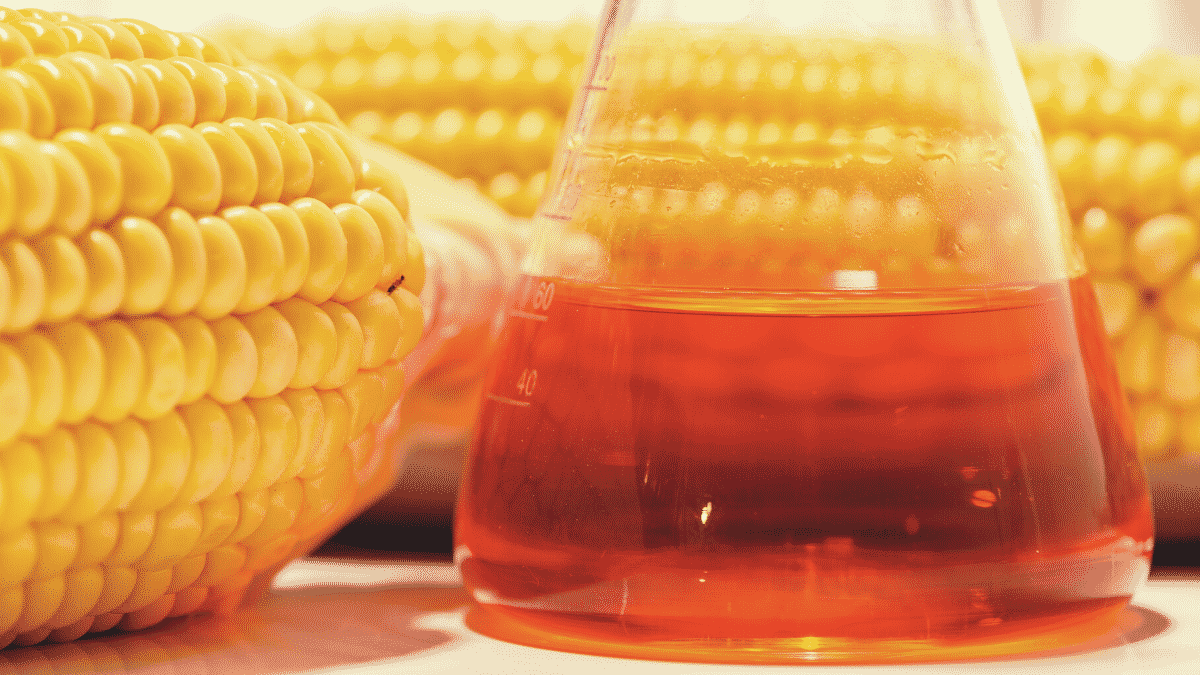Answer: Yes, you can eat corn syrup. Please pay to attention where the corn used for the syrup is produced and if it’s genetically modified.

Being a vegan today can be very challenging. Today we’ll cover one interesting yet controversial ingredient: corn syrup. By the end of this article, you’ll know whether you can eat it and if you’d want to eat it at all.
Table of Contents
What Is Corn Syrup?
Corn syrup is a 100% glucose-based sweetener. It’s thick and lightly sweet compared to other sweeteners out there. In essence, corn syrup is derived from cornstarch that undergoes a chemical process.
If corn syrup is produced from cornstarch, why wouldn’t it be vegan?! Let’s see!
How is Corn Syrup Prepared?
To prepare corn syrup, you’ll need hydrochloric acid, besides cornstarch. Once you combine cornstarch with the acid mentioned above and put it under heating pressure, you’ll get unfiltered corn syrup. If you want sweeter corn syrup, all you need to do is prolong the process. The longer the process, the sweeter your corn syrup will be.
After you get this substance, it needs to be filtered. Filtering removes any color or smell. But the syrup still contains a bit of water that ruins the taste. That’s why the water needs to evaporate, and this will make your corn syrup thicker.
Today on shelves in supermarkets, you may usually find two types of corn syrup:
- Light corn syrup that has vanilla and salt and
- Dark corn syrup has molasses, giving it a caramel kind of color and a more robust flavor than the light one.
So you’ve tried corn syrup, both light, and dark, and it’s not as sweet as you’d like. Then you need to check high fructose corn syrup (HFCS).
High Fructose Corn Syrup
Besides regular corn syrup, there’s also high fructose corn syrup. This syrup is sweeter than stock syrup. But to get more sweetness out of it, you need to apply another chemical process.
This process is known as enzyme conversion. In essence, this means that a percentage of the corn syrup’s glucose is transformed into fructose. And fructose is sweeter.
So far, there’s no sign that corn syrup is against any vegan ‘rule”. But what if I told you that corn is one of the most genetically modified (GMO) foods?
GMO and Corn Syrup
Now that I’ve got your attention, let’s dig into some hard facts.
- 92% of the corn in the USA is genetically modified
- 20% of the farmers in the USA ignore EPA standards when growing corn
- 70% of processed food contains corn and soybean (both are on the top of the most GMO crops)
To understand the above a bit better, let’s see what is actually GMO. GMO is the acronym for genetically modified organisms. In plain words, this means food that has undergone unnatural genetical changes. Further, this means that we, humans, decided to change these organisms.
Why Are Companies Genetically Modifying Food?
Very often, justification for changing what nature carefully created ages ago is found in the following statements:
- Genetically modified food is more resilient (to pests and diseases).
- Organisms that have undergone genetic modification can produce more. For example, genetically modified corn can produce 10% more, according to Kan Wang, a molecular biologist at Iowa State University.
- Greater efficiency in growing food means more food for everybody on the planet.
What Is Used to Genetically Modify Corn?
Here’s another critical question: what is used to genetically change corn? And the answer according to U.S. PIRG:
- chicken genes,
- human genes,
- mouse genes,
- pig genes,
- hepatitis B genes (yes, the virus),
- jellyfish genes
This goes without saying, but all the genes above must be considered non-vegan.
Is Corn Syrup Vegan?
In case you’re buying corn syrup, make sure to check the small letters that mention whether it’s GMO or not. If your supermarket’s corn supplier uses only USA-based corn, you have only an 8% chance to get non-GMO corn. If you’re a dedicated vegan in its purest form, you’ll never consume GMO food. It’d mean you’re consuming genes of animals, other humans, and potentially viruses. This stands against everything veganism stands for.




